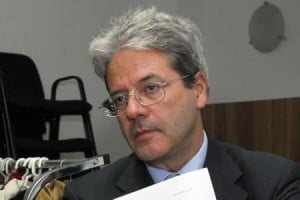By Libya Herald reporter.

Tunis, 12 August 2016:
Italian foreign minister Paolo Gentiloni has said that Rome plans to reopen its embassy in Tripoli “as soon as security conditions allow”, although it may have to operate at a temporary location rather than the existing one.
Speaking in an interview with Italy’s Corriere della Sera, Gentiloni also announced that, as part of its plans to step up its engagement with Libya and the Government of National Accord (GNA), Italy had also appointed a new ambassador, Giuseppe Perrone.
The move comes after an ambassadorial absence of more than a year.
The embassy in Tripoli closed in February 2015, and there was no new appointment when, three months later, ambassador Giuseppe Maria Buccino Grimaldi took up the post of the Italian Foreign Ministry’s Director General for the European Union.
A career diplomat, Perrone, 49, has headed the ministry’s Mediterranean and Middle East department.
Gentioni’s use of the condition “as soon as security conditions allow” is seen a diplomatic let-out, enabling him to state Italy’s good intentions while not actually authorising the embassy to return. Security in Tripoli is not expected to improve in the foreseeable future.
In his interview, published two days after one in the same paper with Presidency Council head Faiez Serraj, Gentiloni also insisted that no Italian special military forces had been sent to Libya. However he refused to answer when pressed as to whether there were Italian intelligence operatives in the country.
Italy, he explained, wanted to be engaged in Libya through in negotiations “rather than ready to flex its muscles”. He refereed to France and the UK in that context, noting that both “deploy special units in Libya”.
But “this does not rule out the possibility of our military also being deployed in Libya”, he added.
Italy has in the past said that it would send military forces to Libya if asked by the Libyan government. However, Serraj, in his interview published on Tuesday, firmly rejected any foreign ground forces being used, and Italian military help in particular.
In an unexpected move, Gentiloni accused Egypt of sowing divisions in Libya. There were some Middle Eastern countries, he said, “such as Egypt” who “make it harder to achieve reconciliation among local factions”.
It was understandable, given the long shared border, that Egypt considered its own security when dealing with Libya, he said but added: “I hope that these legitimate concerns will not give way to a temptation to split Libya into two parts.” That would, he stressed, be “a tragedy for Libya and a big mistake for Egypt”. Fortunately for the moment though, he noted, the Egyptian government appeared determined to work for a united Libya.
Responding to Serraj’s request for a field hospital and that Italy treat Libya’s war-wounded, Gentiloni said he had forwarded the request to the Italian defence ministry “which will see the way things evolve”.
However, on Tuesday, Vincenzo Amendola, Italy’s deputy foreign minister who was in Tripoli for talks with the GNA, said that Italy was willing to set up a field hospital in Sirte.
There are also reports in Italy that the government is looking at a request for Serraj for Italy to provide mine clearance training for the Libyan army.






